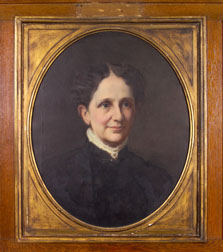I desire the equal growth and prosperity of ALL Christian Scientists, and the world in general; each and every one has equal opportunity to be benefited by my thoughts and writings.
Mary Baker Eddy
Miscellaneous Writings 291:12
| Virginia Harris, C.S.B. – Woman’s Place |
Posted: 06 Mar 2013 08:31 AM PST
“A native of New Hampshire, a child of the Republic, a Daughter of the Revolution…”
Oh, Mary Baker Eddy loved to describe herself as a daughter of New Hampshire! She represented generations of family and neighbors who tilled its soil to birth communities, create schools and churches to nurture individual and communal support, devote lives to freedom and independence, and shape its government and laws. New Hampshire natives created functioning societies where there were none, and made meaningful contributions to the state’s progress and its stature in the newly-formed United States of America. New Hampshire was one of the original 13 colonies that declared independence from Britain in 1776.
By the turn of the 20th century, Eddy reminded the thousands of readers of her publications of what New Hampshire had already achieved:
“The enlightenment, the erudition, the progress of religion and medicine in New Hampshire, are in excess of other States, as witness her schools, her churches, and her frown on class legislation…”
So I think that Mary Baker Eddy would be pleased to know that her New Hampshire has another notable achievement in the annals of civilization’s progress due, in all likelihood, to its legacy: it is the first state in the country to elect all women as its highest leadership. These are the federal delegation (2 Senators, 2 Congresswomen), the Governor, the Speaker of the State House and the chief justice of the State Supreme Court.
Why is this so significant? Why is it important to mark this achievement in the year 2013 – 237 years after the country’s declaration of independence? Because it is evidence of progress in the rights of all mankind to advance due to merit, and not to be held back by bias – in this case by gender.
The New Hampshire example shows this: these leaders proved their merit in different political parties, followed different paths to election and were chosen in different election cycles. They are individuals who earned their way all the way, proving at every step that bias has no place in a democratic society.
There are still battles to be waged and won, here in the US and the world, of gender-based civil rights, for example in education, healthcare, and fair pay. All the more reason to acknowledge and celebrate evidence of progress in New Hampshire.
Mary Baker Eddy’s rich and productive life challenged the 19th century image of women and formed a new model of womanhood that transcended her time and still sets a high standard for the 21st century. She authored a manifesto that continues to revolutionize thinking about the unconditional basis of each individual’s spiritual being, and how this knowledge breaks any and every limitation in life. Her publishing company communicates the practical application of her ideas for everyday living and her global church has adherents serving their communities in 130 countries.
In Eddy’s seminal book, Science and Health with Key to the Scriptures, she devotes several pages to the divine mandate for equality of the sexes, always referring to the Bible for her inspiration. In the second chapter of Genesis, Gihon is mentioned as one of the four rivers of the Garden of Eden – perhaps metaphorically the cradle of civilization. Eddy makes a point of redefining Gihon with a practical meaning and purpose – a mandate – for our time:
Gihon (river). The rights of woman acknowledged morally, civilly, and socially.
New Hampshire’s leadership shows the progress that has been made toward achieving this ideal.
When Mary Baker Eddy returned to her beloved New Hampshire later in life she was probably the most well-known woman in the United States. The local leaders enjoyed reminding their citizens that she was a native daughter, and hung a portrait of her in a place of honor in the capital’s seat of government, the State House…a woman’s place.

